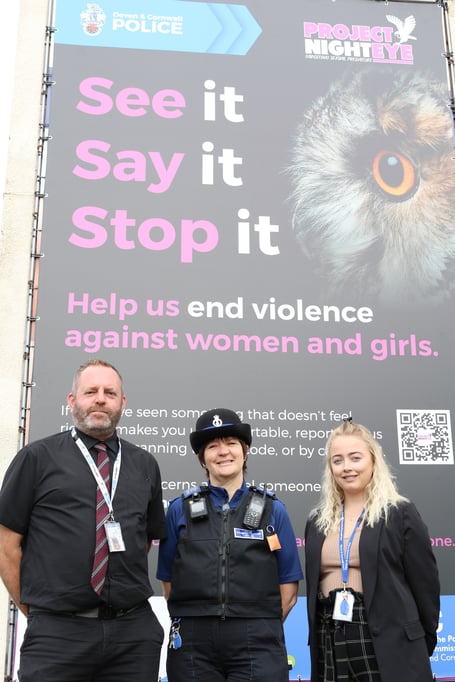Devon and Cornwall Police have launched their latest campaign, Project Nighteye, to tackle violence against women during the evening and nighttime economy.
Siobhan, not her real name, joined Devon and Cornwall Police in March 2023, after being raped by a man posing as a taxi driver. Now a Radio Dispatch Officer, she believes Project Nighteye could stop others from suffering what she endured.
“If Nighteye had been around in 2022, I wouldn’t have been raped,” she insists. “He wouldn’t have been there. He wouldn’t have been able to do what he did.”
Her testimony provides stark context to a campaign designed to make public spaces safer and challenge the culture of silence that allows predatory behaviour to go unchecked.
“Most people are guilty of seeing something and thinking, ‘someone else will report that’,” Siobhan says. “But unless we’re told what’s happening, the police don’t know where to go.”
By encouraging people to report suspicious behaviour, such as excessive attention, loitering or harassment, spiking, taking pictures without consent or physical contact – Project Nighteye aims to build intelligence. By creating awareness and alert the police to public ‘hot spots’, the belief is that this will help prevent crimes before they escalate.
Chief Constable James Vaughn says the defining feature of the campaign is a shift in focus. “It's not the responsibility of women and girls to change their behaviour in order to be safe in public spaces,” he insists.
Using a combination of uniformed and plainclothes officers to patrol the nightlife of cities and towns, the force is concentrating on identifying predatory men and stepping in early.
“We’re looking out for the signs – persistent pestering, unwanted contact, loitering, catcalling, spiking,” Vaughn explains. “All of these can be precursors to more serious sexual misconduct. If you see it and it doesn’t feel right, phone it in.”
Every report, whether from members of the public or officers, is logged. Over time, patterns emerge, helping police track repeat offenders across venues.
“If someone shows up again and again, suddenly we have a picture,” says Vaughn. “That intelligence can be crucial if an allegation is made later.”
This intelligence-led approach is strengthened through partnerships with taxi drivers, door staff, licensees and bus drivers - all encouraged to act as extra “eyes and ears.”
Project Nighteye also includes an education drive. Exeter College students have created TikTok content to reach young audiences, while community leaders are urging men to step up.
“I have a responsibility to also convene men to be in this space to help protect women,” Vaughn adds. “It cannot be left to women to protect themselves or women to drive these initiatives.”
Members of the public can report concerns directly to the police, anonymously through Crimestoppers, or via the StreetSafe app, which allows users to log areas where they have felt unsafe. These reports help officers identify problem areas and deploy resources effectively.
In Oxford, Thames Valley Police trialled a similar initiative, Project Vigilant, in 2019, resulting in a 30% reduction in sexual offending and a 50% drop in rapes in the night-time economy.





Comments
This article has no comments yet. Be the first to leave a comment.